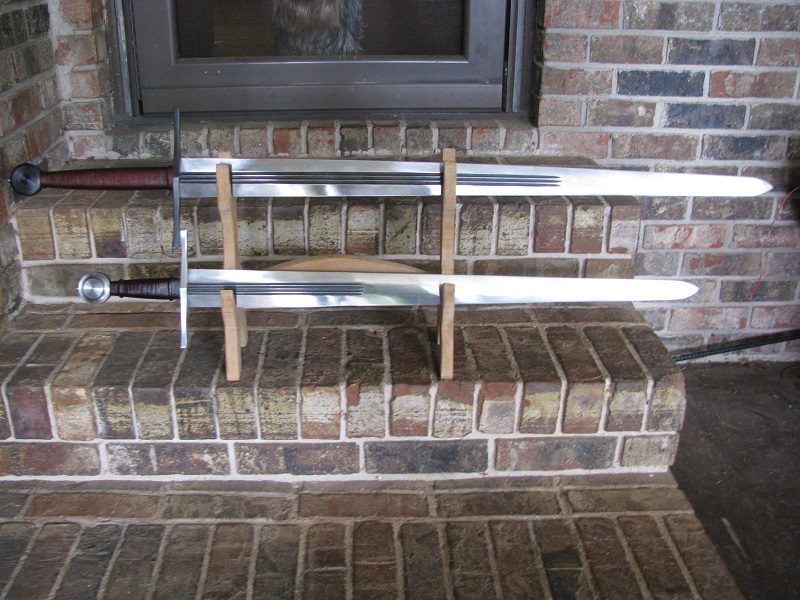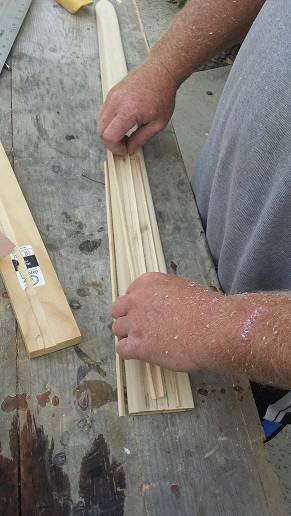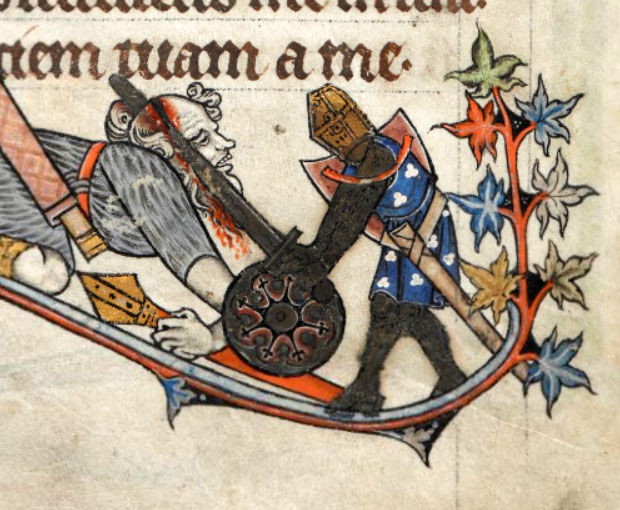| Author |
Message |
|
Lance Morris
|
 Posted: Wed 18 Jun, 2014 8:09 am Post subject: Need Help: 14th Century tapastries that have scabbard/belts Posted: Wed 18 Jun, 2014 8:09 am Post subject: Need Help: 14th Century tapastries that have scabbard/belts |
 |
|
Hello All,
I've purchased an Angus trim XIIIa Warsword. such a beast!
My friend and i have started on a scabbard.
I'm trying to make it historical based although that's proving quite a challenge.
The scabbard is wood core (hand carved out) with raised fullers. Its going to be wrapped in tooled leather.
What are some historical options for a belt and suspension? maybe one in particular that is easy to wear?
does anyone have any documents with pictures I can emulate?
More pictures of the scabbard to come!
cheers
 Attachment: 215.1 KB Attachment: 215.1 KB

the top one
 Attachment: 69.58 KB Attachment: 69.58 KB

|
|
  |
 |
Harry Marinakis

|
 Posted: Wed 18 Jun, 2014 4:16 pm Post subject: Posted: Wed 18 Jun, 2014 4:16 pm Post subject: |
 |
|
I've got an Angus XIIIa as well.
I've done a bit of research on the topic of XIIa and XIIIa war sword suspensions. There isn't much data out there.
The sword belts were wide and generally undecorated. The sword belts were fastened with a buckle, except in Germany where the knotted thong belt was still in use.
There is no evidence that multiple strap suspensions were used, like were used later with the 15th C longswords.It seems that war swords were hung from an offset-belt suspension system just like the one-handed swords of the time.
Generally, the scabbards were plain and undecorated. Integrated triangular leather rain guards were present. The scabbards generally lacked any other decorations or features such as risers, tooling, lockets, rings or chapes.
See the tomb of Prince Edmund "Crouchback" (AD 1245-1296), Earl of Lancaster, at Westminster Abbey, constructed between AD 1296-1301
http://www.westminster-abbey.org/our-history/...-lancaster
See the detail from folio 17r of the Tenison Psalter, circa AD 1284-1316 (below)
http://www.bl.uk/manuscripts/FullDisplay.aspx?ref=Add_MS_24686

|
|
  |
 |
Harry Marinakis

|
 Posted: Thu 19 Jun, 2014 3:20 am Post subject: Posted: Thu 19 Jun, 2014 3:20 am Post subject: |
 |
|
A couple other threads FYI
http://www.myArmoury.com/talk/viewtopic.php?t...highlight=
http://www.myArmoury.com/talk/viewtopic.php?t...highlight=
The problem, as you have discovered, is that it is difficult to find swords in the manuscripts that can be definitively identified as being war swords. And even if you can, often the scabbards are not clearly visible.
While absence of evidence is not evidence of absence - I challenge you to find any images or manuscripts from the war-sword period (AD 1275-1340) that show swords suspended with multiple straps like the later 15th C longswords. The only 14th C images that I can find of two-handed swords show that the big swords were suspended just like the smaller one-handed swords - with an integrated sword belt, sometimes an offset belt.
Therefore, the obvious conclusion is that war swords were carried at the hip like smaller arming swords.
As with the suspension methods - look at scabbard decorations from the war-sword period. Arming sword scabbards were not very elaborate (tooling and mounts) until the early 14th C. The few images of war sword scabbards show that they were quite plain. But based on other scabbards from the same period, it is not unreasonable to construct a moderately-decorated war sword scabbard, if your goal is historical authenticity.
|
|
  |
 |
Alan Schiff
Industry Professional

|
 Posted: Wed 25 Jun, 2014 12:37 pm Post subject: Posted: Wed 25 Jun, 2014 12:37 pm Post subject: |
 |
|
Harry's observations about the belt and scabbard closely reflect my own research.
When doing the scabbard for my XIIa I made a pretty exhaustive look through http://effigiesandbrasses.com/, going for an early to mid 14th century design. Now, most of the effigies on the site seem to show a shorter sword, but I think that one could infer that the carrying methods would be similar for any size sword.
From my research about half the swords are suspended via a plaque one the scabbard, with rings on either side, and half use a 2-piece belt offset on the scabbard. The plaque would cause the sword to suspend vertically, while one with the offset belt would hang at an angle. For a longer sword the offset belt seems more practical, so that is what I went with.
Triangular rain guards were common, although not all scabbards had them, and chapes were seen but not on all scabbards. In the end I went with the offset belt, rain guard, and no chape.
Hope that helps,
Alan
|
|
   |
 |
|
Charlton Miller
Location: Salt Lake City, Utah, USA Joined: 07 Mar 2010
Posts: 4
|
 Posted: Wed 25 Jun, 2014 4:46 pm Post subject: Posted: Wed 25 Jun, 2014 4:46 pm Post subject: |
 |
|
While I'm far less expert than most people who contribute here, I've recently been asking myself the same questions you are. The most helpful thing I've turned up have been good photos of grave effigies - they can be dated fairly accurately, and many of them are extremely detailed.
I've been spending far too much time going through photos hosted by the Medieval Combat Society, for example: http://www.themcs.org/armour/14th%20century%20armour.htm which may be of interest.
|
|
  |
 |
|
|
You cannot post new topics in this forum
You cannot reply to topics in this forum
You cannot edit your posts in this forum
You cannot delete your posts in this forum
You cannot vote in polls in this forum
You cannot attach files in this forum
You can download files in this forum
|
All contents © Copyright 2003-2026 myArmoury.com — All rights reserved
Discussion forums powered by phpBB © The phpBB Group
Switch to the Basic Low-bandwidth Version of the forum
|

